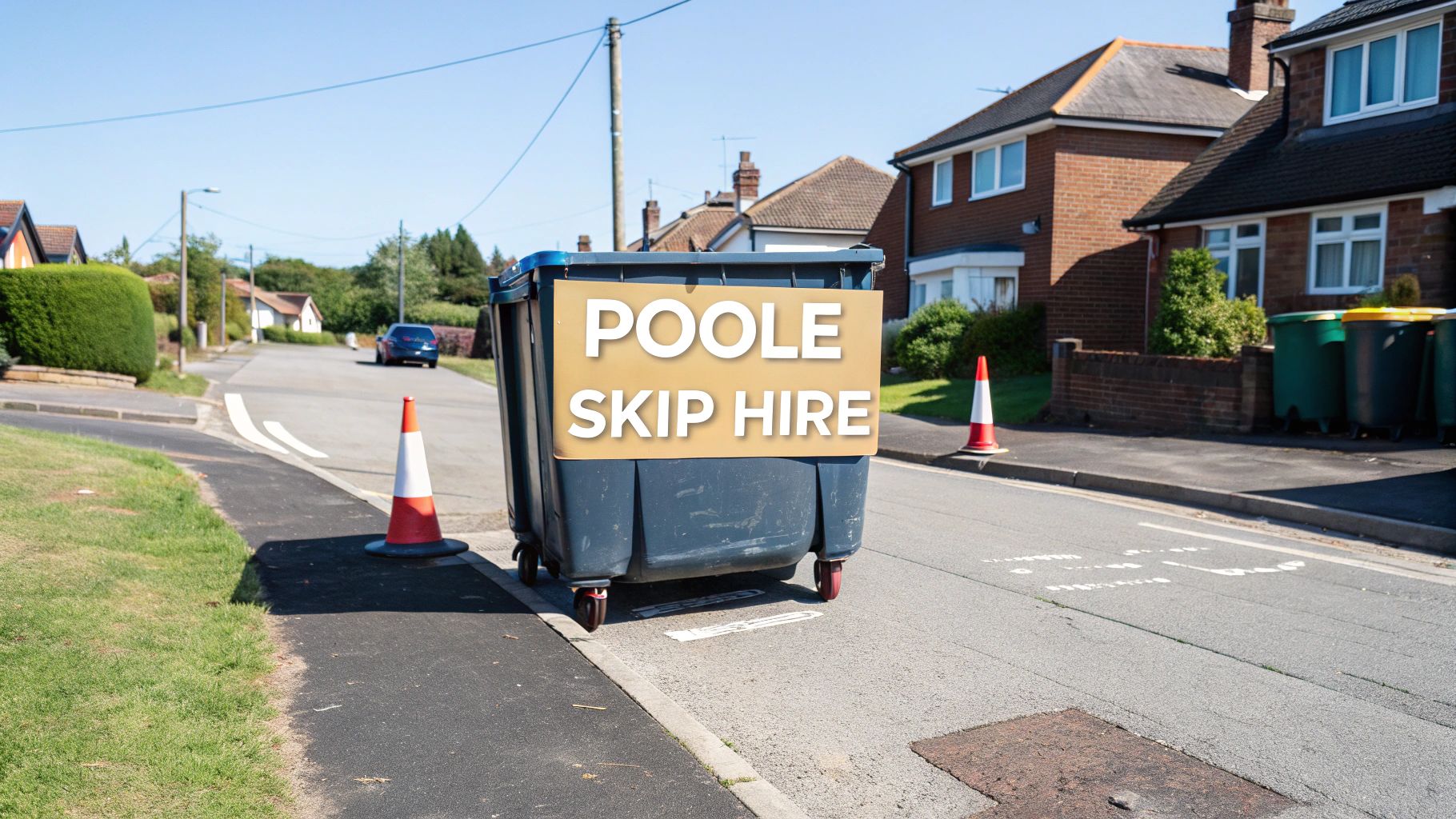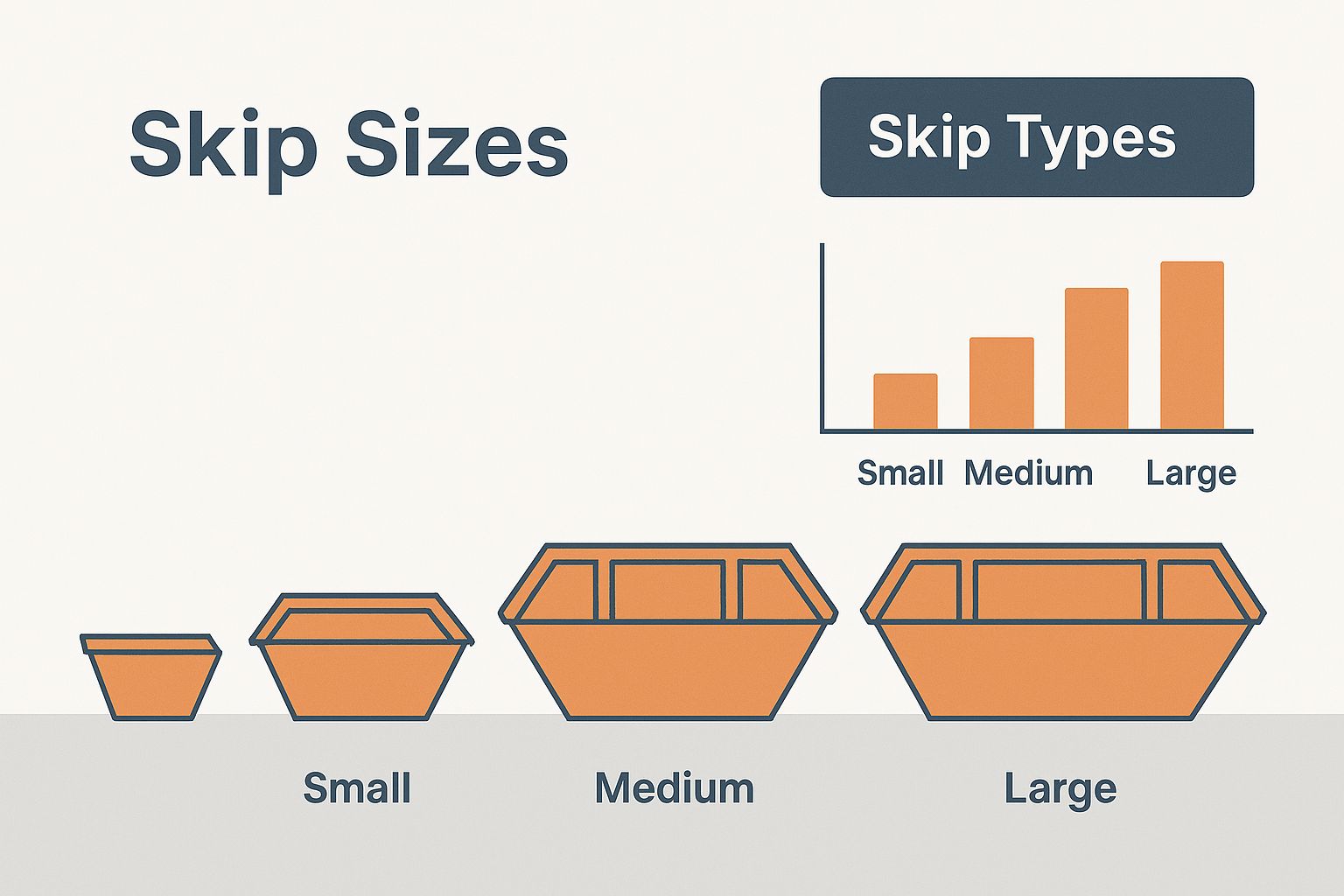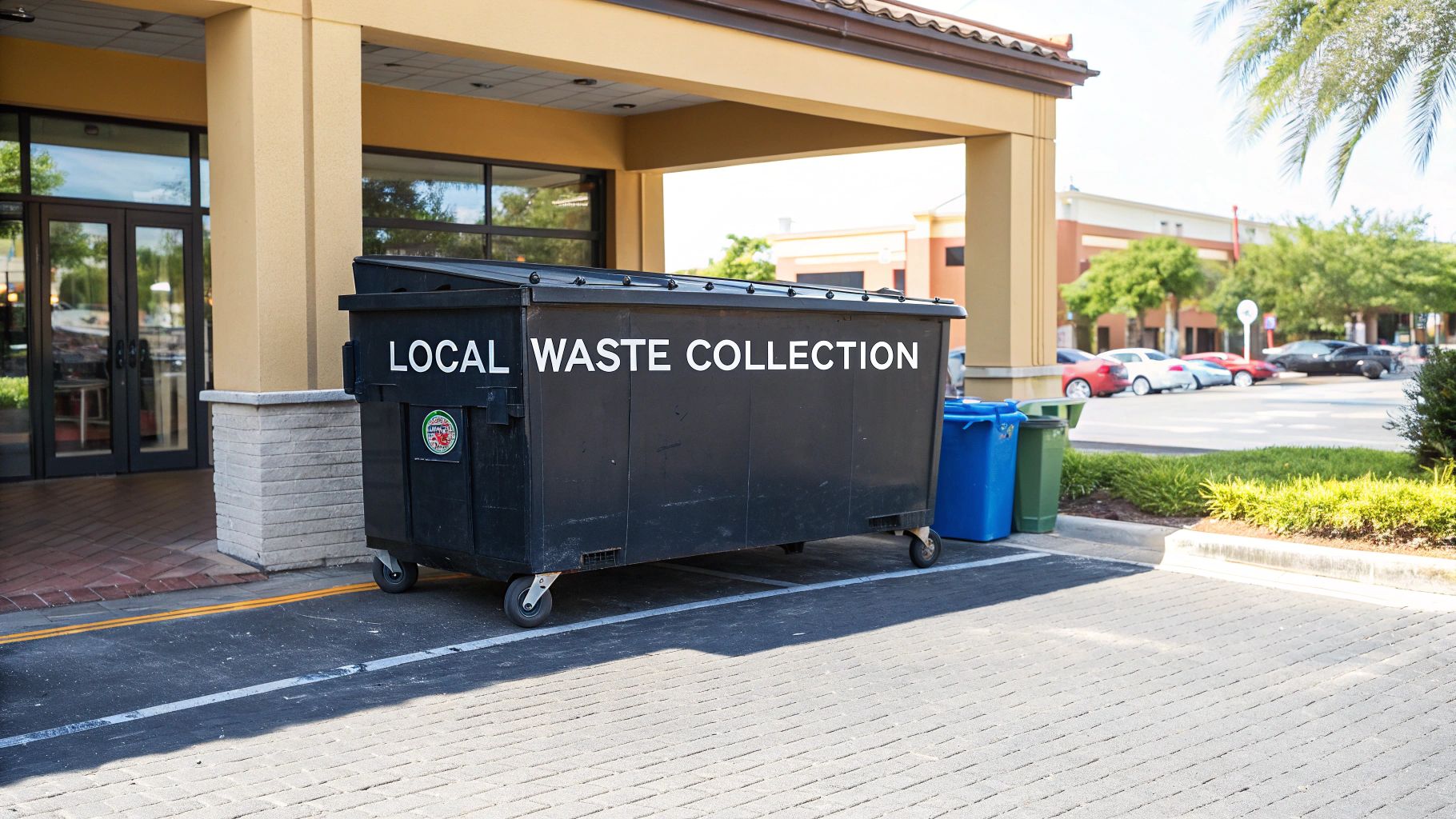Poole Skip Hire | Fast and Reliable Waste Disposal

Poole Skip Hire | Fast & Reliable Waste Disposal
Got a project on the go in Poole that’s going to make a bit of a mess? Hiring a skip is usually the best way to handle it. The whole process is pretty straightforward, but getting a few key details sorted out first will make sure everything goes off without a hitch.
A little bit of planning at the start can save you a world of headaches, extra costs, and unexpected delays down the line.
Getting Started with Skip Hire in Poole
Before you even start looking up prices, the first step is to do a bit of homework. Think of it as a mini-blueprint for your waste. Getting this groundwork right is the secret to a stress-free project, whether you’re tackling a garden clearance in Branksome or renovating a kitchen over in Lilliput.
It really just comes down to answering two simple questions. Nail these, and the rest of the process becomes a breeze.
Assess Your Waste and Location
First up, be honest about how much stuff you need to get rid of. This is where people often trip up. Underestimate, and you’ll end up needing a second skip, effectively doubling your costs. Try to picture the pile. Is it going to be bulky things like an old sofa, or heavy, dense materials like soil and rubble from ripping up a patio? Knowing this is vital for choosing the right size skip.
Next, you need to decide exactly where the skip is going to live while you fill it. This is a crucial decision because it determines what you do next.
- Private Property: If you’ve got a driveway, a decent-sized front garden, or any other private land with good access, things are much simpler. You won’t need to get the council involved at all.
- Public Land: If the skip has to go on a public road, the pavement, or even a grass verge, you are legally required to have a permit from the Bournemouth, Christchurch and Poole (BCP) Council.
Don’t be tempted to chance it. Placing a skip on public land without a permit can land you with a hefty fine and an order to have it removed immediately, which can bring your entire project to a grinding halt. Always sort the placement out before you book.
Prepare for a Smooth Delivery
Once you know where the skip is going, make sure the area is ready for its arrival. The delivery lorry needs clear access, so have a quick check for things like low-hanging tree branches, narrow gates, or neighbours’ parked cars that might get in the way.
It’s also important that the ground is firm and level. A full skip is incredibly heavy, and putting it on soft ground can cause damage to your property.
To keep things simple, here’s a quick checklist to run through before you make the call.
Quick Checklist for Hiring a Skip in Poole
This table breaks down the essential actions you need to take to guarantee a smooth experience from start to finish.
| Phase | Key Action | Why It’s Important |
|---|---|---|
| Pre-Booking | Estimate your waste volume. | Prevents ordering a skip that’s too small or large, saving you money. |
| Pre-Booking | Determine the skip’s placement. | Clarifies if a council permit is needed, avoiding any legal trouble. |
| Pre-Delivery | Clear the access route and placement area. | Ensures a safe, quick delivery without delays or damage to property. |
Thinking about these few things from the outset makes all the difference. You’re not just hiring a container; you’re setting your project up for an easy, efficient clear-up. This initial planning makes everything else, from getting quotes to waving goodbye to your rubbish, feel so much simpler.
Choosing the Right Skip Size for Your Project
Picking the right skip for your Poole skip hire is easily the most important decision you’ll make. It’s the one thing that has a direct impact on your budget, how smoothly your project runs, and frankly, your stress levels.
Get it right, and your clear-out will be a breeze. Get it wrong, and you could be staring at the frustrating and costly problem of needing a second skip.
Let’s ditch the vague terms like ‘mini’ or ‘builder’s’ skip for a moment and get practical. Skips are measured in cubic yards, but what does that actually mean for your project in Parkstone or your big renovation in Canford Cliffs? A really helpful way to picture it is to think about how many standard black bin bags each size can hold.
Matching Your Project to the Right Skip
The best place to start is by thinking honestly about the scale of your job. A small garden tidy-up is going to generate completely different waste from a full kitchen rip-out. Each job needs a different size skip to avoid either paying for empty space or, even worse, running out of it.
Think about these common scenarios:
- Small Domestic Jobs: Clearing out the shed, a weekend garden project, or getting rid of clutter from a single room.
- Medium Renovations: A bathroom refit, a small kitchen demolition, or a bigger garden clearance that involves soil and turf.
- Large-Scale Clearances: A full house clearance, major building work, or projects with lots of bulky furniture and construction waste.
This visual guide is a great way to see the different types of skips available, helping you picture which one will fit your needs.

Seeing them side-by-side really helps to visualise how the capacity scales up, making it much easier to match a real container to the pile of rubbish you have in your mind.
A Practical Comparison of Common Skip Sizes
To give you even more confidence, let’s look at the most popular skip sizes and what they’re genuinely good for. Knowing their capacity in real-world terms is the key to getting it right.
To help you out, we’ve put together a quick guide comparing the most common skip sizes you’ll find for hire in Poole, what they can hold, and what they’re typically used for.
| Poole Skip Size Guide and Common Uses | ||
|---|---|---|
| Skip Size (Cubic Yards) | Approximate Capacity (Bin Bags) | Ideal For Projects Like |
| 4-Yard ‘Mini’ Skip | 30-40 | A weekend garden tidy, clearing a small loft or shed, or waste from decorating a single room. It’s compact and fits easily on most driveways. |
| 6-Yard ‘Small Builder’s’ Skip | 50-60 | One of the most popular for a reason. Great for an old bathroom suite, a small kitchen renovation, or a significant garden overhaul. A brilliant all-rounder. |
| 8-Yard ‘Large Builder’s’ Skip | 70-80 | The go-to for bulky items. Perfect for full house clearances, major construction waste, or getting rid of old furniture. It’s the largest size for heavy waste like soil. |
This table should make it simpler to connect the dots between the job you have planned and the skip you need to book.
If you’re still not quite sure, a more detailed guide can help you figure out exactly what size skip you might need.
The Most Common Pitfall to Avoid
The single biggest mistake we see people make is underestimating how much stuff they actually have. It’s so easy to look at a pile and think a smaller, cheaper skip will do the job. More often than not, this backfires.
The cost of hiring two small skips is always significantly more than hiring one larger skip from the outset. Once you factor in two separate delivery and collection charges, it becomes a very costly error.
And remember, waste expands! A fitted wardrobe, once you’ve smashed it up, takes up a lot more room than it did when it was standing. The same is true for old kitchen units, plasterboard, and even garden cuttings.
Our best piece of advice is simple: if you find yourself stuck between two sizes, always choose the larger one. That little bit extra you pay upfront buys you a safety net and priceless peace of mind. It guarantees you’ll have enough space for everything, preventing the delays and surprise costs that come with a last-minute panic order for a second skip.
Navigating Skip Permits and Local Regulations
One of the first things you need to sort out when arranging your poole skip hire is exactly where the skip is going to live. This one decision changes everything – it determines whether you need to get the council involved, and getting it wrong can cause some serious headaches and unexpected fines.
If you’ve got a driveway or a patch of private land big enough to safely park the skip, you’re in the clear. You can place it entirely on your own property without needing a shred of official paperwork.
However, the moment any part of that skip touches public land—whether it’s the road, a pavement, or a grass verge—a permit becomes a legal must-have.

This isn’t just about ticking boxes; it’s all about public safety and keeping things moving. The permit process makes sure the skip is placed correctly, isn’t blocking traffic or pedestrians, and is managed responsibly from start to finish.
When a Council Permit Is Essential
In Poole, any skip that sits on a public highway has to be covered by a permit from the Bournemouth, Christchurch and Poole (BCP) Council. There are absolutely no shortcuts or exceptions to this rule.
The good news is, you don’t have to wade through the council bureaucracy yourself. Any decent skip hire company will handle the entire permit application for you as part of their service. They know the local system inside and out and will make sure all the i’s are dotted and t’s are crossed.
To get the ball rolling, they’ll just need a few key details from you:
- The exact spot where the skip needs to go.
- How long you’ll need it for, as permits are time-limited.
- Your contact details for the application form.
It’s really important to plan ahead. Permit approval isn’t instant. It usually takes a few working days for BCP Council to process the application and grant the licence, so make sure you factor this delay into your project timeline. Last-minute bookings for on-road skips are rarely an option.
Here’s a key takeaway: never, ever assume it’s okay to pop a skip on the road without permission, even for a short while. BCP Council enforcement officers are out and about, and the fines for not having a permit can be huge, easily dwarfing the actual cost of the permit itself.
The Permit Application and Approval Process
Once you’ve given your chosen skip hire company the details, they’ll fire off the application to BCP Council. The council then takes a look at the proposed location to make sure it’s safe and practical.
They’ll check for things like how close it is to road junctions, bus stops, or pedestrian crossings. Their main job is to maintain public safety and keep disruption to a minimum for everyone else.
The cost of the permit is a standard fee charged by the council, which your skip provider will simply add to your final bill. This fee covers all the admin and the council’s oversight.
Safety Requirements for On-Road Skips
Getting the permit is just the first step. For any skip placed on a public highway, there are strict safety rules you have to stick to for the entire hire period. These aren’t just suggestions; they’re legal requirements.
Your skip has to be clearly visible to every road user, especially at night or in poor weather. This means it needs specific safety markings and equipment.
Your skip provider is responsible for making sure the skip is compliant, which means it must have:
- Safety Lights: Amber lights need to be fixed to each corner of the skip and must be working from dusk till dawn.
- Reflective Markings: The ends of the skip must have reflective markings so they show up clearly in headlights.
- Traffic Cones: Cones should be placed around the skip to help guide traffic safely past it.
Getting to grips with these local rules is a huge part of managing your waste responsibly. For a deeper dive into the specifics, it’s worth exploring the various waste management regulations in Dorset that apply across the county. Following these guidelines doesn’t just keep you on the right side of the law; it protects you, your neighbours, and the general public.
Understanding Skip Hire Costs in Poole
When you get a quote for a Poole skip hire, it’s far more than just a number plucked from thin air. It’s actually a careful calculation based on several moving parts. Knowing what goes into that final figure helps you see the real value you’re getting and avoids any nasty surprises down the line.
Think of it this way: you’re not just paying for the steel box that lands on your drive. The price covers its journey, the team who handle it, and the complex, regulated process of dealing with your waste in a responsible way. Once you get your head around these components, it becomes much easier to compare quotes and pick a company that offers genuine value for money.

The Core Cost Factors You Control
A few key elements of the price are directly down to the choices you make for your project. These are the variables you can tweak and are the most straightforward to understand.
- Skip Size: This is the big one. As you’d expect, a larger skip costs more than a smaller one. It holds more waste, and that extra volume costs more to transport and process.
- Hire Duration: Most companies offer a standard hire period, usually around one to two weeks. If your job runs longer and you need to keep the skip, you’ll likely face an extra charge for each additional week.
- Council Permit Fees: If you don’t have a private driveway and the skip needs to go on a public road in Poole, the BCP Council permit fee gets added straight to your bill. This is a non-negotiable cost set by the council, not the skip company.
Being clear on these three points from the outset will give you a solid idea of your baseline costs.
What Goes On Behind the Scenes
Away from the obvious, a number of operational and regulatory costs are baked into every skip hire quote. These are the things that cause prices to shift over time and vary from one region to another, reflecting the true cost of running a compliant waste service in Dorset.
One of the biggest hidden costs is the UK’s landfill tax. This is a government levy slapped on every tonne of waste buried in the ground, designed to push us all towards recycling. And it’s always going up. As of 2025, landfill tax rates have continued to climb, directly hitting skip hire prices. The standard rate jumped from £91.35 per tonne back in 2019 to £126.15 per tonne by April 2025 – that’s a whopping increase of nearly 38%. You can discover more insights about the rising cost of landfill tax and how it’s shaking up the industry.
This tax is precisely why responsible disposal is so critical for modern skip hire firms.
Every reputable skip hire company invests heavily in sorting facilities. The more waste they can divert from landfill by recycling materials like wood, metal, soil, and hardcore, the less landfill tax they have to pay. This commitment to recycling helps keep costs as competitive as possible for you.
Operational and Regional Expenses
Finally, the day-to-day costs of simply running the business play a huge part. These can change quite a bit depending on the local economy here in Poole and across Dorset.
Just think about these ongoing expenses:
- Fuel Costs: Skip lorries are big, heavy vehicles, and they drink a lot of fuel. Any swings in diesel prices have a direct and immediate knock-on effect on the cost of deliveries and collections.
- Labour Costs: Paying skilled, licensed drivers and yard staff a proper wage is a major part of the overall business spend.
- Maintenance and Insurance: Keeping a fleet of HGVs on the road safely is an expensive business, involving constant servicing, MOTs, and hefty insurance policies.
So when you get a quote for a Poole skip hire, you’re seeing a comprehensive price that wraps all of this together. It covers the delivery of a clean skip, its collection when you’re done, the journey to a licensed waste station, the hands-on sorting process, and the final, ethical disposal of everything you’ve thrown away. Understanding this helps you appreciate that a fair price reflects a professional, compliant, and environmentally sound service.
What Can and Cannot Go in Your Skip
Finally, the satisfying bit – filling up your skip. But it’s not just a case of chucking everything in and hoping for the best. Getting it right is crucial for a few big reasons: it keeps the waste handlers safe, ensures you’re following environmental laws, and saves you from any nasty surprises like extra charges. Any decent Poole skip hire company will be working under strict waste regulations.
Think of a standard mixed waste skip as the perfect home for all the common, non-hazardous stuff left over from a house clear-out, garden makeover, or DIY project. It’s built for the bulky items your wheelie bin can’t handle and the heavy debris from a renovation.
What’s Generally Allowed in Your Skip
For most jobs, the list of acceptable waste is pretty broad and covers almost everything you’ll likely need to get rid of. You can confidently start loading up your skip with a whole range of materials from around the house and garden.
Generally speaking, you’re fine to dispose of:
- Household Items: Old furniture like sofas, tables, chairs, and cabinets.
- Wood: Floorboards, fence panels, old timber, and offcuts from building work.
- Soil and Rubble: Bricks, concrete, stones, and soil from landscaping projects.
- Metal: Non-electrical scrap metal items.
- Plastics: Hard plastics like old kids’ toys or garden furniture.
- Green Waste: Branches, leaves, grass cuttings, and other garden bits.
This covers the bulk of what most people in Poole are looking to shift during a typical clear-out. Stick to these general waste types, and you’ll have a hassle-free experience.
Here’s a top tip from experience: load your skip smartly. Lay flat items like doors or large panels at the bottom to create a solid base. Then, you can fill the gaps with smaller bits and pieces. Try to spread the heavy stuff out evenly to keep the skip stable and safe for the collection team.
Restricted and Prohibited Items You Must Avoid
Okay, this is the part you really need to pay attention to. Certain materials are classified as hazardous or need a special disposal route, which means they must never go into a standard mixed waste skip. If they do, you risk the collection being refused or getting hit with some hefty penalty fees to cover the costs of safe removal.
This isn’t just about company rules; it’s a legal requirement. These items can be genuinely harmful to people and the environment if they’re not handled properly.
Here’s a clear list of what is strictly forbidden:
- Plasterboard: When this material gets wet and mixes with other waste, it can release a nasty gas called hydrogen sulphide. It always needs to be disposed of separately.
- Asbestos: An incredibly dangerous material. It must only ever be handled and removed by licensed specialists.
- Electricals (WEEE): Pretty much anything with a plug or batteries – from a kettle to a TV or a fridge freezer. These fall under Waste Electrical and Electronic Equipment regulations.
- Batteries: Both car batteries and household batteries contain nasty chemicals and are a real fire hazard.
- Tyres: These are a real headache to process and have to go to a specialist recycler.
- Paint Tins & Solvents: Any tins that aren’t completely empty, plus chemicals, oils, and other liquids, are all considered hazardous waste.
- Gas Cylinders: These pressurised containers pose a serious risk of explosion.
- Medical Waste: For obvious health and safety reasons, any kind of clinical or medical waste is a definite no-go.
Knowing the rules is half the battle won. If you’re ever unsure about an item, the best thing to do is just ask your skip hire provider before you throw it in. For a more detailed look, our guide explains more about what you can’t put in a skip and why these rules matter so much. A quick check beforehand can keep your project running smoothly and save you from any unwelcome and expensive problems on collection day.
Your Poole Skip Hire Questions Answered
Even with the best plans, questions always seem to pop up just as you’re about to book a skip, or sometimes right in the middle of a job. It happens. We’ve put together this little guide to tackle the most common queries we get about Poole skip hire.
Think of this as your go-to for those last-minute “what if?” moments. From accidentally overfilling your skip to figuring out collection, we’ve got you covered.
What Happens If I Overfill My Skip?
This is easily one of the most common worries we hear, and for a very good reason. It’s so tempting to try and squeeze in that last little bit of rubbish, but overloading a skip is a serious issue.
Every skip has a maximum fill line – it’s level with the top of the container. That line isn’t just a friendly suggestion; it’s a legal requirement for safe transport on the road. An overfilled skip is a genuine hazard, as items can fall out and cause accidents. Because of this, our drivers are legally forbidden from collecting a skip that’s been loaded past the fill line.
If your skip is piled too high, the driver will likely have to ask you to remove the extra waste before they can take it away. This can cause frustrating delays for your project and might even lead to a wasted journey charge if we have to make a second trip.
The best way to deal with this is to avoid it in the first place. If you’re on the fence about what size to get, it’s always smarter to go a size up. If you do end up with more waste than you planned for, just give your skip hire company a call straight away. They can often arrange a separate, smaller collection for the overflow.
How Long Can I Keep the Skip?
The standard hire period for a skip in Poole is usually somewhere between one and two weeks. For most home projects, like clearing out the garden or redoing a bathroom, this is plenty of time. This timeframe is what’s typically factored into your initial quote.
Of course, we know that projects don’t always stick to the schedule. If you realise you need the skip for a bit longer, the best thing to do is get in touch with your provider as soon as you know. Most companies are pretty flexible and can sort out an extension for a small additional weekly fee.
It’s always better to communicate in advance rather than just holding onto the skip past its collection date. A quick phone call helps the company adjust their schedule and saves you from any unexpected charges.
Do I Need to Be Present for Delivery or Collection?
Great practical question. For the most part, you don’t need to be at home for either the delivery or the collection, provided you’ve given clear instructions and the site is ready.
To make sure an unattended delivery goes smoothly:
- Provide Clear Instructions: Let the company know exactly where you want the skip. Using landmarks helps, like “on the left side of the driveway, next to the big rose bush.”
- Ensure Full Access: Double-check that any gates are unlocked and the route is clear of parked cars, low-hanging branches, or anything else that could get in the way.
- Confirm Placement Area: The spot you’ve picked out needs to be solid, level, and free of any obstructions.
The same applies to collection. As long as the lorry can easily get to the skip and it hasn’t been overfilled or blocked in by a car, the driver can handle it without you needing to be there.
Will the Price of My Skip Go Up This Year?
Cost is always a big factor, and it’s smart to think about what prices might do in the future. The good news is that despite rising operational costs across the board, the UK skip hire industry has stayed relatively stable in 2025, especially here in Dorset.
Thanks to better technology and more efficient waste sorting, many companies have been able to absorb some of the increased landfill fees. Industry analysis suggests only modest price increases are expected, mainly because improved recycling capabilities are helping to keep disposal costs down. If you want to keep your own costs low, the best strategy is always to pick the right skip size from the start and avoid overfilling. You can read more about how skip hire companies are managing costs in 2025.
This focus on recycling is a win-win – it’s better for the environment and for your wallet. It’s another good reason to choose a company that’s serious about responsible waste management.
Ready to clear your waste without the hassle? The Waste Group offers reliable, competitively priced skip hire across Poole and Dorset, with a service you can trust.

